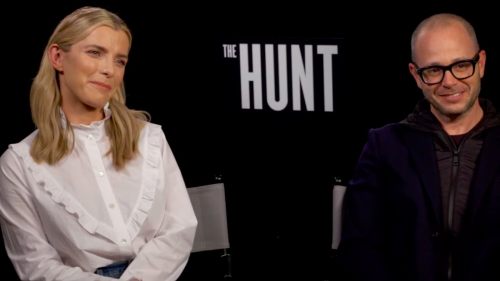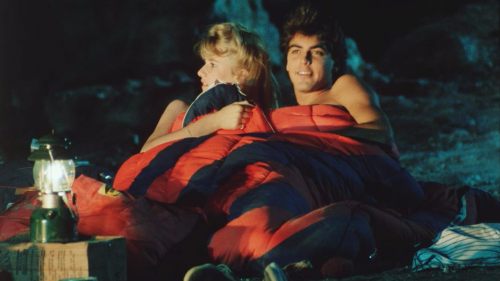TOMORROWLAND Review: There’s No Future In This Movie
Maybe Brad Bird should have just made Tomorrowland as an editorial. A few thousand words about his disinterest in dystopian fiction, with some thoughts about how the kind of scifi we consume impacts us as people and a society - that would have been interesting, would have maybe sparked a conversation. Instead Bird has made a narrative with those concepts, a narrative where characters actually deliver speeches that could have been paragraphs in that editorial - all while hurtling towards a conclusion where the bright hope for the future is… blowing shit up.
The future ain’t what it used to be, says Tomorrowland, and it says it again and again. There’s a plot, but it’s slight, and it’s structured in such a lackadaisical way that the film’s stakes don’t even become clear until the third act (there’s actually a joke about this in the movie’s opening, which is the first part of a wrap-around, and which feels mandated by the studio in an desperate attempt to give the film some structure). Young Frank Walker goes to the 1964 World’s Fair with a semi-functional jetpack he has designed on his farm, and he enters it into a science project competition that gets him the attention of a mysterious young girl named Athena, and which gains him access to the transdimensional dreamworld known as Tomorrowland, or more correctly John Galtville. Then the movie jumps forward to today, to a world fifty years later that is ugly and falling apart and that has lost all hope. The space program has been shut down and everybody’s watching post-apocalypse films and everything sucks. It's our world.
This is the world in which Casey Newton lives, but she’s a dreamer. She’s hopeful. She’s committing sabotage on the project that is dismantling the launch platforms at Cape Canaveral. And this gets her noticed by a mysterious young girl named Athena, who gives her a button that, when she touches it, gives her visions of the tomorrow of Tomorrowland. She starts to pursue it, and she ends up with Frank, now a bitter old man who has been kicked out of paradise. Then they fight some robots and shit explodes at the end.
The film’s structure is a disaster, and much of the movie feels like a pilot. It takes so very, very long to actually begin telling you a story (as opposed to just having Casey run from robots and then meet Frank and run from robots with him) that it has to cram all of that story - conflict, villain, the whole nine yards - into perhaps twenty minutes of screentime. The heroes go from figuring out what the menace is to figuring out how to stop the menace in the space of one scene. Of course the way to stop the menace is to blow it up, so maybe it shouldn’t have taken even that long to figure out.
Tomorrowland’s explosive climax is indicative of the movie’s schizophrenic streak, one possibly caused by heavy-handed studio interference. The finale removes heroine Casey from the equation entirely, despite spending a lot of time establishing her as having the one superpower that might be able to save the day (this power, I shit you not, is the power of positive thinking). This is supposed to be the bright, shiny movie that rejects the dominant narratives of doom and violence, so why does it end with such extraordinary violence?
That schizophrenia is evident elsewhere. Tomorrowland is a city built to allow our greatest thinkers the room to do their thing, free of politics or real world restrictions (and, one assumes, safety regulations). And they achieve wonders… none of which make their way to our world, And I don’t think I’m spoiling anything by telling you that it seems as if they never will - the movie never once even stops to ponder what all the levitation and giant robots and space travel laser beams could do for, you know, regular people. The movie doesn’t care about regular people - it cares only for the exceptional and the geniuses. If The Incredibles left you wondering whether Bird is an Objectivist, Tomorrowland will not give you an further clarity on the subject, but it will make you suspicious as hell.
Frank’s story is schizophrenic as well. He’s an embittered old man because he’s been kicked out of Tomorrowland. Why was he kicked out? Well, in this pro-science movie he was kicked out for inventing something he should not have invented - and we learn his invention is a real deal bad thing. Avengers: Age of Ultron has a more measured approach to ‘meddling with forces you don’t understand’ than Tomorrowland does. I couldn’t believe that this is where Bird brought it - that Frank’s invention was bad and needed to be blowed up real good. Again, I think this is all coming from studio interference, but at the same time the script is co-written by Damon Lindelof, the reigning king of whiffing it in the third act. Tomorrowland continues this inability to take the story home, an inability that is certainly coming to define who Lindelof is as a writer.
George Clooney plays old Frank, and he’s deeply miscast. Frank is a cranky, bitter old man who hates everyone and everything, and who lives in a highly booby-trapped farmhouse all on his own (where he hoards the future tech he has invented, not allowing any of it to fall into normal human hands). He’s basically the anti-Clooney, and I don’t think George is quite up to the task. Robbed of his charisma and smile Clooney becomes irritating; what’s worse is that his character is obsessed with young Athena, who hasn’t aged a day since she inducted 8 year old Frank into Tomorrowland back in 1964. Seeing grizzled old Clooney mooning over a pre-teen is unsettling; their final scene together actually made me worried because I honestly thought he was going to kiss her.
Clooney should have been cast in the Hugh Laurie role, Governor Nix, the nasty guy running Tomorrowland. At the end Nix gives a speech about being mystified by the way humanity seems to be embracing the apocalypse, and it’s a good speech - the kind of villain moment where you start thinking ‘Shit, this guy has a point!’ - and I think Clooney could have killed it. Not that Laurie doesn’t, but he has the crumpled demeanor of a burnt out boy genius in a way that Clooney never quite does. Their roles should have been swapped.
Clooney is the name on the marquee, but the lead is Britt Robertson, who is oddly too old for her role. Not that she’s old, but Casey is clearly supposed to be very young, early high school, and Robertson looks to be in her early 20s. In a movie where George Clooney seems to be on the verge of kissing a 9 year having his other young female sidekick be a super attractive girl in her 20s playing 15 only makes everything feel odder.
Robertson is terrific, and I wish she had a better movie in which to star. She’s strong and funny and smart, and she does a lot with dialogue that is by turns corny and bad. If I’m rooting for Tomorrowland at all it’s because of Robertson as the lead, playing a tech smart girl whose being a girl is never an issue or a problem. And in a movie where people stop to monologue about global warming that’s actually an achievement.
Her excellence is a big part of why the ending sucks so hard - Casey is so cool, so well-portrayed, that when the action movie finale sidelined her I just threw my hands up in the air (metaphorically speaking. I was pretty immobile most of the film, largely because the movie is dull as hell). Robertson deserves better, and I hope she gets it - and I’m sure she’s going to be a staple of superhero fancasting moving forward.
There are moments that work in Tomorrowland. I quite liked the big shoot out in a nostalgia shop, during a scene featuring Kathryn Hahn and Keegan-Michael Key. The scene is fun and inventive, and there’s some interesting thematic material here - the bad guys run a nostalgia shop! And this movie is sort of all about nostalgia for an old vision of the future! - but it’s an island in a sea of mediocrity. And mediocre is, until the punishingly stupid finale, the key word here.
I like what Brad Bird is saying in Tomorrowland, I just don’t like the fact that he has two hours of shaggy, pointless and often boring film hung on the points he’s making. Yes, we could use some more positivity. Yes, we should be galvanizing the youth for the future, not making them fear it. But we should also be making movies with strong stories and structures that work, and we should be cognizant of the political messaging of a movie where the super secret technological wonderland must stay hidden from plebes like us, unworthy of its rewards.



